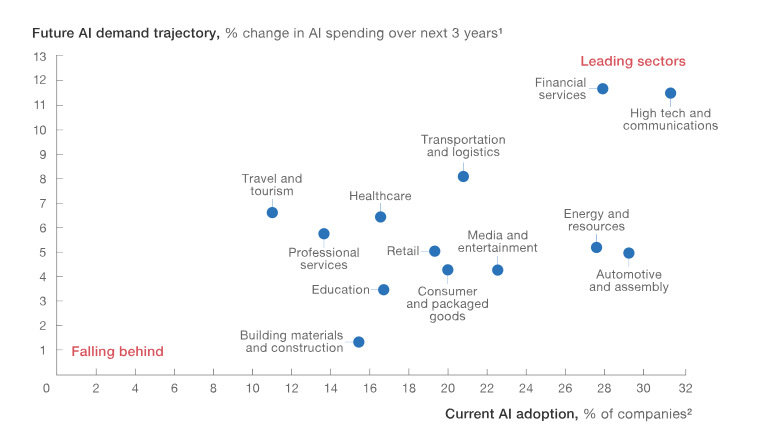Top MBA programs and Premier Consulting Firms are leaning towards and AI centric manager.
INSEAD Dean and other major MBA schools’ leaders around the world say that the demand to understand AI (artificial Intelligence) and what’s possible with AI is increasing in their classes.
Leaders around the world recognize that there is a fundamental need to understand what the technology can do and how it impacts businesses processes. Most importantly it is vital that managers have the specialized knowledge to lead business transformation by leveraging this new technology.
At the time I am writing this brief, #AI applications in the industry are primarily focused to increase productivity in some form. Although we see emerging applications in transforming BI into AI generated insights for managers, the ability to distill, synthesize and manipulate information to generate value in the market place still resides with the manager in most enterprises.
Mckinsey Global Institute conducted a study that demonstrates how the adoption of current AI technologies is uneven across industries and companies as well. This study shows, indirectly, that AI savvy managers are also in great demand because in several industries the value proposition of this emerging technology is not yet clear. The business value is far from being realized.

From Mckinsey Global Institute
As a results managers will have to guide two parallel processes within most enterprises:
a) The discovery and application of new use cases that greatly can improve productivity in their enterprises and,
- b) The research, design and execution around building a new class of products that leverage this technology.
While the tech and financial sectors are the ones that push the technology adoption harder, it is also absolutely plausible that significant opportunities lie in the application of AI to industries that are currently falling behind.
In both these two processes the role of managers is to identify the opportunities, deign the process or product and set the quality measures for successful execution.
In each of these three areas:
- Identify the opportunity
- Design the process or product
- Measure success
The understanding of the underlying potentiality of the technology as well as the intricacies of execution are necessary. The reason is that without the awareness of what possible and what not possible, opportunities may be overlooked or the wrong direction maybe be picked.
The set of competencies necessary is varied and may not be evenly distributed across the various management levels inside the enterprise. In other words, the specific knowledge required by a product manager is different than that required to a strategy manger or a product marketing manager, however it is the synergistic application of this knowledge that will generate the economic value promised by the rise of AI in the contemporary enterprise.
While a new class of recent MBA graduates enter the market with both expectations and basic theoretical knowledge, the managers currently in charge are the ones that need to fill the gap from where their companies are today and where they ought to be tomorrow.







Leave A Comment